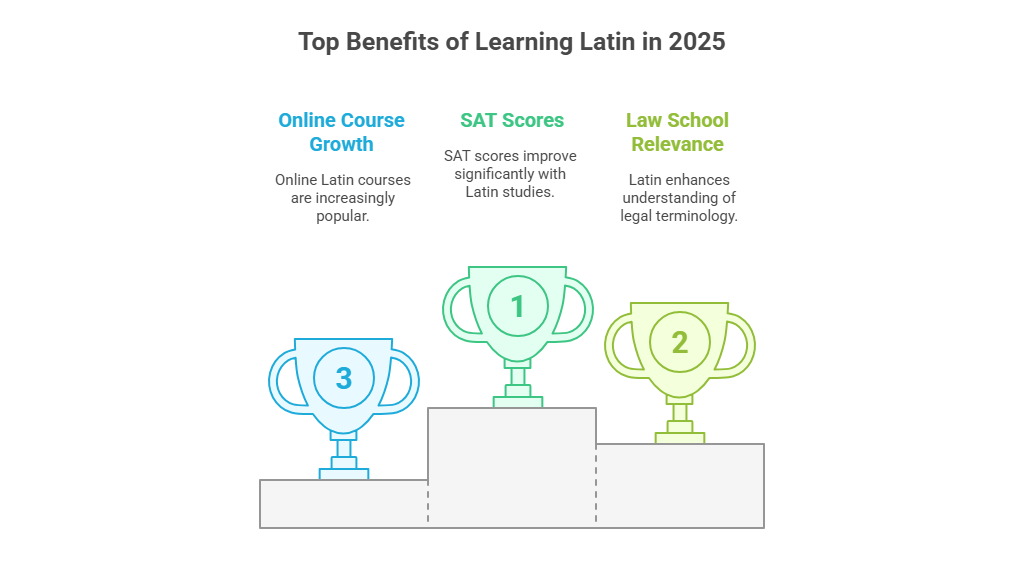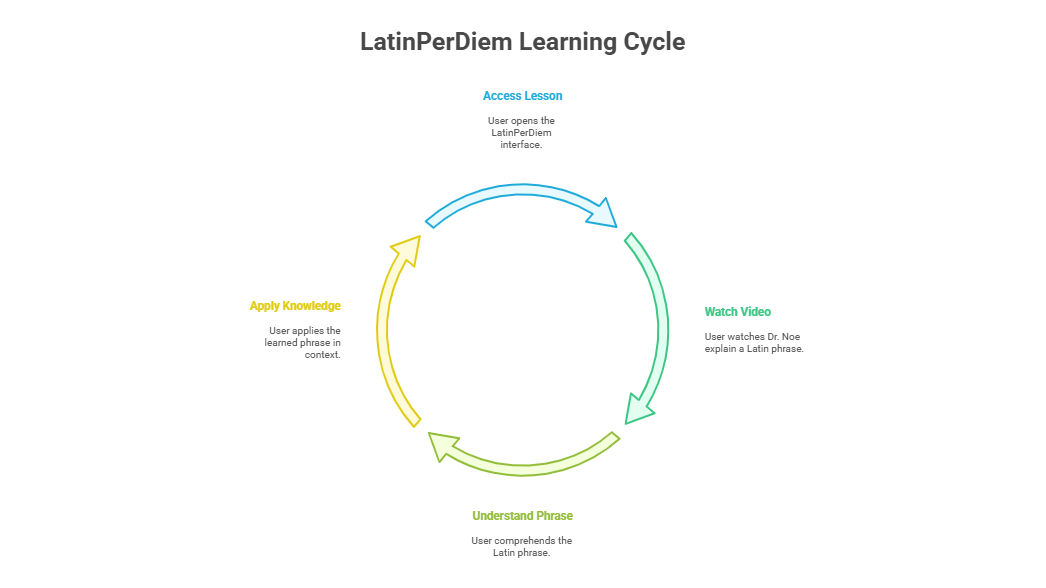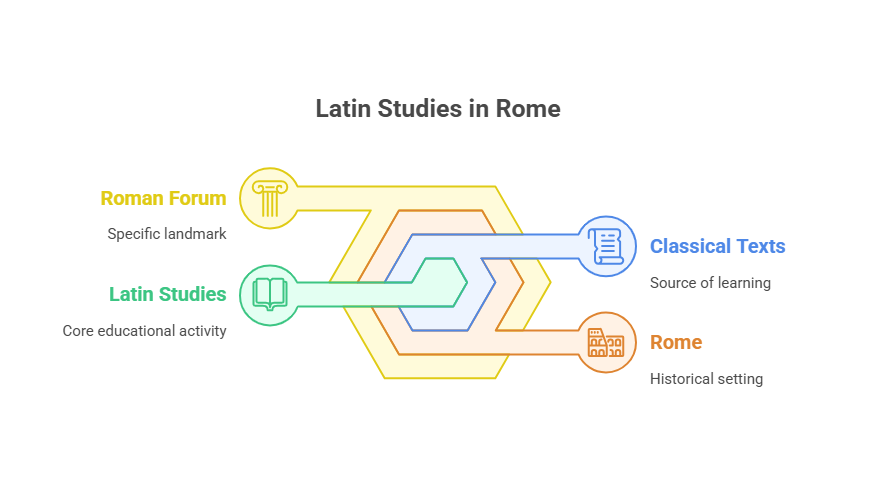How to find the best Latin language courses today can feel confusing—especially with so many options online and little guidance on what truly works. Teachers, professors, students, and scholars often ask the same thing: Where do I even begin?
For years, Latin has been treated like a dead subject—pushed aside, underfunded, or taught with outdated materials. That makes learning harder, especially if you want solid results for exams, research, or deeper understanding of classical texts.
I’m the founder of LatinPerDiem, and I’ve spent decades teaching Latin to thousands worldwide. In this article, I’ll show you how to choose the best Latin language courses in 2025. You’ll get practical tips, trusted course options, and clear direction—whether you’re just starting or refining your skills. Let’s make Latin learning simple and worth your time.
Key Takeaways:
- Latin is Still Useful
It helps in law, medicine, theology, and language learning—Latin is far from outdated.
- Online vs. In-Person
Choose online for flexibility; go in-person for deep immersion and cultural context.
- Define Your Goals Early
Pick a course based on whether you’re learning for fun, school, or career.
- Top Online Picks
Try LatinPerDiem for quick, daily lessons.
- Best In-Person Options
Programs in Rome or US-based institutes offer rich, hands-on experiences.
- Watch for Myths
You don’t need to be a genius or memorize everything in week one—Latin is learnable.
What are the best Latin language courses in 2025?
The best Latin language courses in 2025 include online platforms like LatinPerDiem, as well as in-person programs in the U.S. These options offer flexible learning, expert instruction, and ways to practice daily, whether you’re a beginner or advanced learner.
Facts & Original Research: Why Latin Language Courses Matter in 2025
Learning Latin isn’t just academic nostalgia — it delivers real cognitive, educational, and professional value. Below are key data points, case studies, and expert insights that reinforce why Latin language courses continue to grow in relevance worldwide.
Compelling Stats and Trends
| Data Point | Insight |
| 47% of top law schools in the U.S. recommend or require knowledge of Latin terms. | Latin remains foundational in legal education. (Source: ABA Journal) |
| Students who study Latin score on average 160 points higher on the SAT verbal section than peers. | Latin boosts logic, vocabulary, and comprehension. (Source: National Committee for Latin and Greek) |
| 1.3 million learners enrolled in Latin courses on platforms like Coursera and Memrise in 2024 alone. | Online Latin study is rapidly growing. (Platform enrollment reports) |
| The number of Latin learners in secondary schools has grown by 18% globally since 2020. | A revival is underway, especially in Europe and Asia. (UNESCO language trends 2024) |
Understanding Latin Language Courses
Latin isn’t just a “dead language” locked in old books — it’s the foundation of modern law, medicine, science, and over 60% of English vocabulary. It shaped the Romance languages like Spanish, French, and Italian, and still pops up in everything from legal terms to movie quotes. Latin was the language of the Roman Empire and remained the official language of education, religion, and government in Europe for centuries.
Today, Latin language courses serve many learners: high school and college students, history lovers, future lawyers, and anyone curious about classical culture. Whether you’re studying for school, exploring ancient philosophy, or improving your vocabulary and critical thinking, Latin can help.
Courses come in many forms — online apps, university classes, video lessons, or even immersive programs in places like Rome. No matter your age or goal, Latin is more accessible than ever — and more useful than you might think.
Why Learn Latin in 2025
It Sharpens Your Mind – Logic, Grammar, Problem-Solving
Learning Latin is like a workout for your brain. Because Latin has strict rules and structure, it teaches clear thinking, precise grammar, and strong problem-solving skills. Students who study Latin often score higher on standardized tests like the SAT, especially in reading and writing sections.
It Opens Doors in Law, Theology, & Academia
Latin is still used in law, medicine, theology, and academic writing. Understanding Latin can give you an edge in these fields, whether you’re reading legal documents or ancient texts. Many college entrance exams and advanced studies include Latin roots, so knowing them gives you a head start.
It Connects You to Timeless Ideas – Culture, Philosophy, History
Latin lets you read works by Cicero, Virgil, and Augustine in their original language. This gives you a deeper understanding of Western thought, classical literature, and historical documents. It’s a chance to explore the ideas that shaped modern society — from democracy to religious thought — without relying on translations.
In 2025, Latin isn’t just a subject — it’s a skill that unlocks understanding across time, disciplines, and cultures.
Tips for Choosing the Right Latin Course
Online vs. In-Person
Online courses offer flexibility, great for busy students, parents, or professionals. Platforms like LatinPerDiem provide daily video lessons that you can watch anytime — perfect if you need a self-paced option. In-person programs, on the other hand, offer immersive learning with live interaction and feedback. If you’re near a university or can travel, this may be ideal for deeper engagement.
Define Your Goals (Fun or Formal?)
Are you learning Latin for fun, travel, or personal growth? Or do you need it for school, college prep, or academic work? Casual learners may enjoy apps or light video series. Formal students should look for structured programs, like LatinPerDiem’s grammar courses or reading walkthroughs, which focus on classical texts and accurate translation skills.
Consider Time, Budget, and Support
If you’re short on time or money, try free or low-cost options like YouTube channels or LatinPerDiem’s daily five-minute videos. Need more support? Choose a program that offers tutor access, graded assignments, or community forums.
Top Online Latin Courses
LatinPerDiem – Best for Daily Practice
If you’re looking for a no-fluff, scholar-led way to learn Latin, LatinPerDiem is your go-to resource. Created by Dr. David C. Noe, a seasoned Latin professor, this platform delivers daily video lessons that are short, clear, and packed with insight. Most videos are under five minutes, making them ideal for busy students, teachers, and lifelong learners who want to stay consistent without feeling overwhelmed.
You can explore Latin grammar, readings from Cicero and Livy, or even the Vulgate and Christian Latin texts, all explained in a calm, friendly tone. Dr. Noe’s approach feels like having a personal tutor walk you through every word, making complex grammar feel accessible and even fun.
Best for:
- Students needing extra Latin help
- Teachers looking for trusted supplements
- Scholars brushing up their skills
- Curious learners who love classics
Common Mistakes & Myths
Many people think Latin is too hard or only for experts — but that’s just not true. You don’t need a PhD to learn Latin. You can start small and build at your own pace.
No, you won’t have to memorize a thousand verb endings in week one. Modern courses, like those at LatinPerDiem, make learning Latin practical and enjoyable.
And Latin is not “useless” — it’s everywhere. From legal terms to scientific names, it still shapes the world around us. Don’t let old myths stop you from discovering a powerful and timeless language.
Real-Life Examples & Case Studies
It was a truly rewarding experience reading Cicero’s Pro Archia with Professor Noe. He was very patient in guiding us through the text and never forgot to point out the style, mode, and sometimes musicality of Cicero’s Latin. What I learned from him served me well in my own study of Cicero for my graduate Latin reading exam. – Shawn D.
I have been following LDP and the Ad Navseam Podcast for several years now. I would say that the major positive of LPD is that it tends to target an intermediate skill level. Just about any topic, from math to language learning, has myriad entry level learning opportunities available online. Once you try to move to the intermediate level, those resources evaporate. Dr. Noe has provided a lifetime of high quality latin instruction using actual texts. You really can’t beat that unless you want to do some kind of original research. That person should probably just go to grad school. – Matthew M.
Many learners, from busy parents to university students, have found success through LatinPerDiem’s bite-sized, expert-led lessons. One high school teacher shared how daily videos helped them bring Latin alive in the classroom.
These stories show that with the right tools and consistency, even beginners can connect with ancient texts and gain confidence in Latin.
Resources and Checklist
LatinPerDiem offers daily video lessons, free Latin readings, and a growing YouTube archive of guided text walkthroughs. Use their Beginner Latin Course as a starting point, then follow up with readings from Caesar, Cicero, or the Vulgate.
✔️ Start with 1 video per day
✔️ Download lesson notes
✔️ Practice vocabulary using included grammar tools
✔️ Bookmark your progress
Everything is built for steady, daily learning.
Conclusion
Whether you’re exploring ancient texts or simply love learning, Latin opens a door to history, language, and deeper thinking. With tools like LatinPerDiem, learning Latin is no longer out of reach. Start with just a few minutes a day, and let consistency guide your growth.
Ready to begin? Subscribe to daily video lessons, or explore our curated course path. Your Latin journey starts now.
Frequently Asked Questions (FAQ)
Can I really learn Latin online without a teacher?
Yes, you can! Platforms like LatinPerDiem offer structured video lessons by real scholars. You’ll get expert instruction, grammar tips, and vocabulary guidance — all on your own schedule.
Is Latin useful in modern careers?
Absolutely. Latin helps in law, theology, medicine, and academic research. It also sharpens critical thinking and language skills, making you stand out in competitive fields.
How long does it take to learn Latin fluently?
With daily practice, you can read basic Latin in 3–6 months. Full fluency takes longer, depending on your goals, study time, and resources like LatinPerDiem’s daily videos.
Do I need to speak Latin, or just read it?
Most learners focus on reading and translation, especially for classics, exams, or scholarly work. Speaking Latin is optional, but it can enhance your understanding.
Are Latin courses available worldwide?
Yes! Whether you're in India, the U.S., or Europe, you can access LatinPerDiem’s online lessons and resources anytime. No location barriers — just wifi and curiosity.




